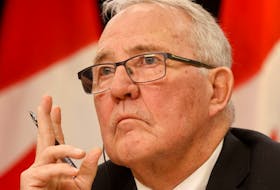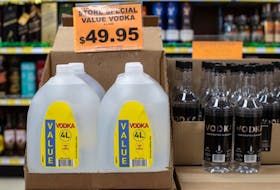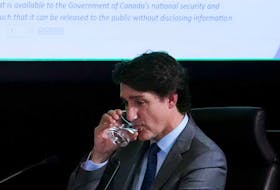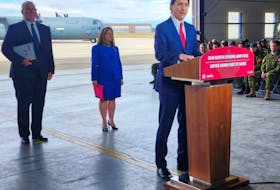Jody Wilson-Raybould proclaimed herself surprised that she was disqualified from Justin Trudeau’s gathering of party leaders last week to discuss the rail blockades.
She really shouldn’t have been. As an independent MP, she’s the leader of a party of one.
Moreover, Trudeau is not Abraham Lincoln, who was famous for his ability to form working relations with people who had previously opposed him.
Wilson-Raybould’s offer to mediate with Wet’suwet’en chiefs was also ignored.
Yet, despite the injured feelings on both sides over the SNC-Lavalin affair, who is better qualified to navigate through this entanglement than an Indigenous former justice minister?
Trudeau proclaimed the blockades “untenable” in his press conference on Friday and called for the barricades to come down – a position not unlike Andrew Scheer’s earlier this week, which the prime minister called “unacceptable.” At press time, it was unclear whether the Ontario Provincial Police would enforce the injunction to remove the blockade, or whether the Mohawks at Tyendinaga would resist.
But it seems certain that the dispute is not going to be resolved any time soon.
Wilson-Raybould would be a useful interlocutor between Ottawa and the Indigenous leadership.
She gave a speech in the House of Commons last Tuesday that got closer to the heart of the matter than all the bloviating from the government side. She said Trudeau has been talking about his “most important relationship” being with Indigenous people for five years. Two years ago he gave a speech that talked about legislative changes to reset that relationship. “What have we seen as a result of that speech? Honestly, almost nothing,” she said, claiming the hard work to implement reconciliation has been “punted.”
The solution to the immediate blockade crisis involves the prime minister talking directly to Wet’suwet’en leaders, she said, followed by a cooling off period, where construction does not take place on the Coastal GasLink pipeline until tension has eased.
But it is the failure to move on transformative legislation that underlies this dispute – and the others that will follow.
As Wilson-Raybould pointed out, all Canadian governments have known since at least the Royal Commission on Aboriginal Peoples nearly 25 years ago that foundational change is overdue.
The Commission said that Indigenous people cannot flourish as wards of the state, incapable of controlling their own destiny, and suggested the reconstitution of larger First Nations as political entities, within the context of Canada (the Indian Act broke up 80 or so First Nations into 630 bands, which the Royal Commission deemed too small to provide effective self-government.)
It further recommended an initial recognition period, in which Indigenous governments exercised core functions close to home, and a subsequent treaty process, in which First Nations negotiated over an expanded land base with the Canadian government. The commissioners were clear that this did not mean full restitution of former lands – “they do not wish to push non-aboriginal Canadians into the sea or deprive them of their backyards.” But Indigenous peoples did – and do – expect to be dealt with fairly, with redress paid in land or cash.
The 4,000 pages and 440 recommendations delivered by the Royal Commission was largely ignored, until, two decades later, Trudeau used similar language to get elected.
It is the failure to move on transformative legislation that underlies this dispute – and the others that will follow
But progress has been non-existent and we are a week or so away from Canadians in Ontario and Quebec running out of propane to heat their homes.
“The time for action is now,” said Wilson-Raybould. “No more half-measures, no more lofty rhetoric, no more setting up interminable negotiations that get nowhere very slowly over years and years.”
There are no heroes in this story. Even Wilson-Raybould recognizes that the Wet’suwet’en need to have an “internal dialogue” to decide who speaks on their behalf – the hereditary chiefs, the elected band chiefs or some new form of governance. “The solutions may be complex but at its core the problem is really very simple. Who represents Indigenous peoples in Canada?”
Failure of successive governments in Ottawa to recognize Indigenous self-determination and land rights is now coming back to hurt Canada and the economy – and it will only get worse.
The government seems set to import legal reforms that entrench human rights standards.
David Lametti, the justice minister, told the House of Commons that he is committed to introducing legislation to implement the United Nations Declaration on the Rights of Indigenous Peoples by the end of this year.
In relation to Canada, UNDRIP’s most pertinent articles revolve around the rights to self-determination and self-government. In large measure the declaration would entrench rights won in court and clarify Canada’s position on the need to obtain “free, prior and informed consent.” Successive court decisions have ruled that Indigenous groups do not hold a veto on development. It would mean the right of redress when it comes to compensation for traditionally owned land. Crucially, UNDRIP states that nothing could “dismember” or “impair” the territorial integrity of Canada.
Legal reform is a start but Wilson-Raybould and others contend that UNDRIP remains unworkable unless there is broader legislation that supports those First Nations that want to come out from under the Indian Act and become self-governing.
None of this is easy. The Assembly of First Nations is unlikely to welcome legislation that restores 80 nations from 630 bands, putting many chiefs and councillors out of work. There will be disputes on overlapping territory and fishing rights.
But the prize is glittering – the creation of productive, self-sustaining First Nations that contribute to Canada, rather than disrupt it.
• Email: [email protected] | Twitter: IvisonJ
Copyright Postmedia Network Inc., 2020








